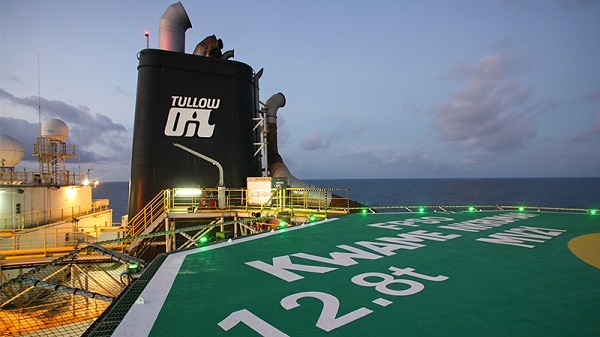The Institute of Economic Affairs (IEA) has raised concerns over indications that government intends extending the production licence of Tullow Oil PLC (Tullow) to 2040, following a recent memorandum of understanding (MoU) signing between the state and the international oil company.
According to the policy think-tank, although the MoU has been described as non-binding – and with nearly a decade remaining on the current contract – its effect could be to lock Ghana into legacy terms that no longer serve the public interest.
Tullow announced in early June that it – along with Kosmos Energy, PetroSA, Ghana National Petroleum Corporation (GNPC) and Explorco – had signed an MoU to extend the West Cape Three Points (WCTP) and Deep Water Tano (DWT) licences to 2040.
These blocks cover the Jubilee and TEN fields, two of Ghana’s most productive oil assets.
The MoU includes approval for drilling up to 20 additional wells in the Jubilee field, representing an investment of up to US$2billion in Ghana over the licenses’ life. The joint venture (JV) expects this extension to result in a significant increase of gross 2P reserves.
Tullow said the MoU outlines key principles that support continued development of the Jubilee and TEN fields. These include a commitment to increase the supply of gas from the fields to around 130 million standard cubic feet per day (mmscf/d), a reduced gas price for Jubilee associated gas, a guaranteed reimbursement mechanism for gas sales and investment in GNPC and the Petroleum Commission’s technical capacity, with a focus on advanced technology.
“All terms and conditions of the existing WCTP and DWT Petroleum Agreements remain in place and continue unchanged,” the company said.
Following the MoU, it is expected that there will be a submission for approval of a Jubilee Plan of Development (PoD) Addendum, the signing of new fully-termed gas sales agreements (GSAs) and a request for parliamentary approval of the payment security mechanism and licence extensions, all anticipated before end of third quarter 2025.
In light of these developments, IEA argues that Ghana’s Constitution and laws – particularly Articles 181(5) and 268(1) – require parliamentary approval for such significant resource transactions.
The think-tank added that the Supreme Court’s jurisprudence affirms that substance must prevail over form when determining whether agreements require legislative ratification.
These legal concerns were raised during a policy roundtable on ‘Reviewing Petroleum Agreements for the Good of Ghana’, hosted by the IEA.
In his keynote address, Managing Consultant-Excel Legal Consultancy, Victor Anku-Tsede, warned that the decisions under consideration risk repeating past extractive missteps. He cited Ghana’s long experience with large-scale gold mining, where national returns have been modest due to investor-favourable agreements, weak fiscal regimes and limited enforcement capacity.
Regarding the oil and gas sector, he said early petroleum agreements included overly generous terms, such as low royalties, high cost-recovery allowances, stabilisation clauses and modest state participation, reflecting Ghana’s frontier status and institutional limitations at the time.
“While these succeeded in attracting investment, they left the country with a government take far below global averages, estimated in some cases at just 42 percent, compared to a typical 50–65 percent range for maturing producers,” he said.
He called for a comprehensive reform of petroleum agreements, stressing that this is not a radical proposition but a globally consistent approach to maximising public benefit.
“Other nations, Senegal, Namibia, Tanzania, Angola and Mexico, have all undertaken petroleum contract reform in response to evolving national goals. These examples offer Ghana useful lessons in balancing investor certainty with fiscal justice and democratic accountability.”
He proposed the creation of a Petroleum Agreement Review Committee, introduction of reopener clauses in future contracts, greater public access to contract information through a dedicated portal and reforms to the Petroleum Revenue Management Act (PRMA) to support clean energy transitions.
“The stakes are too high,” he said. “MoUs that determine decades of production and billions in revenue must be ratified by parliament. We must shift from informal agreements to enforceable mandates and from opaque negotiations to full democratic oversight.”
Also weighing in, retired Chief Justice Sophia Akuffo questioned the rationale for extending Tullow’s licence by an additional four years – particularly in light of a recent tax arbitration that resulted in substantial financial awards against the state.
“We need to take a pause and review the experience, the terms, where we want to go…and how that fits with the president’s vision of resetting the nation, before we tie ourselves,” she said.
Responding to the concerns raised, Collins Adomako-Mensah, Deputy Ranking Member of the Select Committee on Energy and Member of Parliament (MP) for Afigya Kwabre North, noted that the Minister for Energy and Green Transition had indicated a final agreement on the licence extension will be brought before parliament.
“Be assured that members of the Energy Committee of Parliament are going to do a very thorough job,” he said, pledging that lawmakers will safeguard the national interest.
Similarly, Kofi Arko Nokoe, MP for Evalue Ajomoro Gwira and a member of the Energy Committee, welcomed the stakeholders’ concerns and gave assurances that parliament will act in the best interest of Ghanaians once the agreement is submitted.
How social engineering hacks your mind and your bank account
